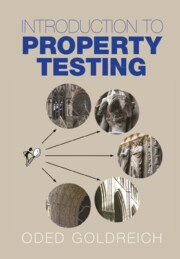Book contents
- Frontmatter
- Contents
- Preface
- Organization and Chapter Summaries
- Notation
- Acknowledgments
- 1 The Main Themes: Approximate Decision and Sublinear Complexity
- 2 Testing Linearity (Group Homomorphism)
- 3 Low-Degree Tests
- 4 Testing Monotonicity
- 5 Testing Dictatorships, Juntas, and Monomials
- 6 Testing by Implicit Sampling
- 7 Lower Bounds Techniques
- 8 Testing Graph Properties in the Dense Graph Model
- 9 Testing Graph Properties in the Bounded-Degree Graph Model
- 10 Testing Graph Properties in the General Graph Model
- 11 Testing Properties of Distributions
- 12 Ramifications and Related Topics
- 13 Locally Testable Codes and Proofs
- Appendix A Probabilistic Preliminaries
- Appendix B A Mini-Compendium of General Results
- Appendix C An Index of Specific Results
- References
- Index
13 - Locally Testable Codes and Proofs
Published online by Cambridge University Press: 13 November 2017
- Frontmatter
- Contents
- Preface
- Organization and Chapter Summaries
- Notation
- Acknowledgments
- 1 The Main Themes: Approximate Decision and Sublinear Complexity
- 2 Testing Linearity (Group Homomorphism)
- 3 Low-Degree Tests
- 4 Testing Monotonicity
- 5 Testing Dictatorships, Juntas, and Monomials
- 6 Testing by Implicit Sampling
- 7 Lower Bounds Techniques
- 8 Testing Graph Properties in the Dense Graph Model
- 9 Testing Graph Properties in the Bounded-Degree Graph Model
- 10 Testing Graph Properties in the General Graph Model
- 11 Testing Properties of Distributions
- 12 Ramifications and Related Topics
- 13 Locally Testable Codes and Proofs
- Appendix A Probabilistic Preliminaries
- Appendix B A Mini-Compendium of General Results
- Appendix C An Index of Specific Results
- References
- Index
Summary
Summary: We survey known results regarding locally testable codes and locally testable proofs (known as PCPs). Local testability refers to approximately testing large objects based on a very small number of probes, each retrieving a single bit in the representation of the object. This yields superfast approximate testing of the corresponding property (i.e., being a codeword or a valid proof).
In terms of property testing, locally testable codes are errorcorrecting codes such that the property of being a codeword can be tested within low query complexity. As for locally testable proofs (PCPs), these can be viewed as massively parameterized properties that are testable within low query complexity such that the parameterized property is nonempty if and only if the corresponding parameter is in a predetermined set (of “valid statements”).
Our first priority is minimizing the number of probes, and we focus on the case that this number is a constant. In this case (of a constant number of probes), we aim at minimizing the length of the constructs. That is, we seek locally testable codes and proofs of short length.
We stress a fundamental difference between the study of locally testable codes and the study of property testing. Locally testable codes are artificially designed with the aim of making codeword testing easy. (The same holds with respect to locally testable proofs.) In contrast, property testing envisions natural objects and properties that are prescribed by an external application.
This chapter has been adapted from our survey [130, 132], which was intended for readers who have general background in the theory of computation but may lack familiarity with property testing.We chose to maintain this feature of the original text and keep this chapter self-contained. Hence, the property testing perspective is mentioned but is not extensively relied upon. In particular, the fact that locally testable codes correspond to a special case of property testing is not pivotal to the presentation, although it is spelled out. Viewing PCPs in terms of property testing is less natural, yet this perspective is offered too (even in the foregoing summary); but again it is not pivotal to the presentation.
This chapter also differs from the other chapters in its style: It only provides overviews of results and proofs, rather than detailed proofs. Furthermore, the footnotes provide additional details that may be more essential than in other chapters.
- Type
- Chapter
- Information
- Introduction to Property Testing , pp. 370 - 410Publisher: Cambridge University PressPrint publication year: 2017



